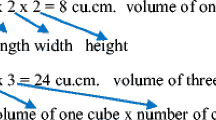Abstract
College students operating under related cooperative contingencies (students had to earn individual credit before being considered for group credit) showed more consistent individual and group improvement on exam performance than students operating under unrelated contingencies (individual credit and group credit were independently determined). A balanced ratio between individual and group credit proved to be the most productive ratio under the related contingency, whereas a ratio favoring group credit over individual credit proved most productive under the unrelated contingency. In general, a ratio favoring individual credit over group credit was the least productive in promoting both individual and group improvement under both unrelated and related contingencies. The findings showed less difference in improvement of exam scores for students of different performance levels than had been evident in previous research.
Similar content being viewed by others
References
Cohen, J. (1988). Statistical power analysis for the behavioral sciences (2nd ed.). Hillsdale, NJ: Lawrence Earlbaum Associates.
Ebert-May, D., Brewer, C., & Allred, S. (1997). Innovation in large lectures: Teaching for active learning. Bioscience, 47, 601–607.
Ferguson, G. A., & Takane, Y. (1989). Statistical analysis in psychology and education (6th ed.). McGraw-Hill.
Johnson, D. W., & Johnson, R. T. (1999). Making cooperative learning work. Theory into Practice, 38, 67–73.
Johnson, D. W., Johnson, R. T., & Smith, K. A. (1998). Cooperative learning returns to college: What evidence is there that it works? Change, 30, 26–35.
Slavin, R. E. (1987). Developmental and motivational perspectives on cooperative learning: A reconciliation. Child Development, 55, 1131–1137.
Slavin, R. E. (1991, February). Synthesis of research on cooperative learning. Educational Leadership, pp. 72–81.
Slavin, R. E. (1996). Research on cooperative learning and achievement: What we know, what we need to know. Contemporary Educational Psychology, 21, 43–69.
Stockdale, S. L., & Williams, R. L. (2004). Cooperative Learning at the college level: Differential effects on high, average, and low performers. Journal of Behavioral Education, 13, 37–50.
Williams, R. L., Carroll, E., & Hautau, B. (2005). Individual accountability in cooperative learning groups at the college level: Differential effects on high, average, and low performers. Journal of Behavioral Education, 14, 167–188.
Author information
Authors and Affiliations
Corresponding author
Rights and permissions
About this article
Cite this article
Carroll, E., Williams, R.L. & Hautau, B. Cooperative Learning Contingencies: Unrelated versus Related Individual and Group Contingencies. J Behav Educ 15, 191–202 (2006). https://doi.org/10.1007/s10864-006-9032-8
Published:
Issue Date:
DOI: https://doi.org/10.1007/s10864-006-9032-8




